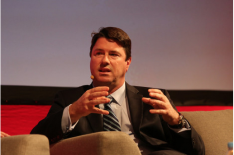Ten posts $7.9m loss for first half with McLennan admitting programming needs to improve
Network Ten has posted a $7.983m loss for the first six months of its financial year, as its earnings before interest, tax, depreciation and amortisation (EBITDA) collapsed from $34.9m to $10.056m in the comparative period to February 28 with CEO Hamish McLennan admitting the programming and content on the main channel “needs to be improved.”
Although on paper the loss for this year looks better than the $243m loss recorded for the corresponding period last year, that number included a substantial voluntary write-down of the value of its TV licence.
In its report released to the Australian Securities Exchange this morning the broadcaster says it has already used $55m of a $200m loan taken out in September with the backing of its major shareholders. It also shows while TV revenues grew $28m, around 4.4 per cent, costs were $38m higher (8.8 per cent up), an indication the network lost money on its investment in the Big Bash Cricket and Sochi Winter Olympics.



Its getting back into shape!
“Strict cost control is part of TEN’s DNA” – what a load of spin. Revenue increases by $28m but costs increase by $38m, I’m not the smartest bean counter in the world but even I can see costs are not under control and cash is dwindling fast.
In years to come Channel Ten will be used as an example as to why you never put ad men in charge of a business.
We all know that bagging Ten delivers you better page impressions, but your angle is wrong here. These are positive results.
A loyal employee makes an attempt to insult smart peoples intelligence and puts a positive spin on what are shocking results whichever way you cut. As a shareholder I am doing high 5’s – maybe something about 5m the CEO now god took in his pocket. Might ask for it back.
Hey bonus boy
it’s easy to say ‘cut costs’ when one is insulated from any actual cuts.
Those who think quarter-to-quarter, seed nothing for the future.
It’s the programming, stupid!
smug smug smug……..
Ray I also believe in Peter Pan and that there are fairies at the top of the garden. That being the case 10 on this stated performance is in great shape!!!. For the record I worked there when it was a highly competitive network run by TV people not ad agency guys, who purport to know what viewers want from a network.
To Mr McLennan, are these results based on metro ratings alone or metro plus regional?
Of course NONE of this is Hamish’s fault. It’s all because of that naughty Mr Warburton.
What does an ex advertising guy know about general entertainment programming and scheduling? Or anything about television?
LoveTV. It depends. Successes seem to be founded on metro and regional ratings hence McLennan’s claim that Sochi and Big Bash were successes for the network. If only the media would report it that way.
The only programs McLennan can’t apply that to are Wake Up and Studio 10 because no one watches them in either market.
Come on McLennan claim responsibility for your failures as much as your “successes”.
The reality is until the board decide to get an experienced TV person in there as CEO,recruit TV executives to fill TV roles then this is just going to get worse, 26cents and the value that puts on the company overall is unheard of. The 2 signature summer brands big bash and Winter Olympics were purchased at a premium,been well documented and that promotional platform was to have 10 out of the blocks with their survey line up being well promoted in the minds of viewers. You serve up rubbish in wrong time slots and viewers watch shows not networks. The result is a 10 share in night time. How much chance does the sales team have of selling that, unless they massively discount which is what they are doing so the ad market says.This is not going to get better until the root of the problem is fixed.